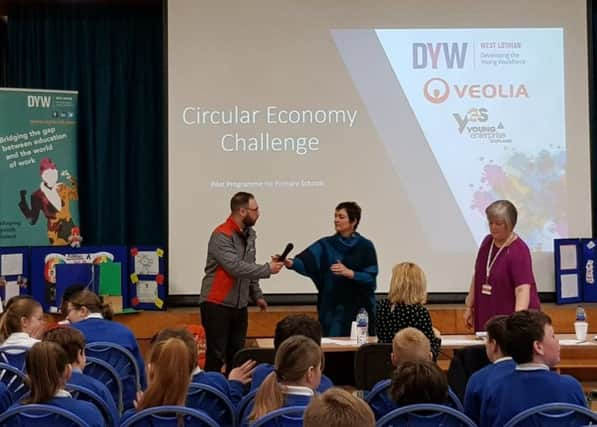Lauren Brown: Circular Economy Challenge was a load of rubbish – and the children loved it


According to a recent report published by the Institute for the Future, experts estimate that around 85 per cent of the jobs that today’s learners will be doing in 2030 haven’t been invented yet.
If this is an accurate reflection of the future of the labour market, it presents a challenge for educators to be able to effectively prepare young people for their future careers.
Advertisement
Hide AdAdvertisement
Hide AdWorking in partnership with Veolia and Young Enterprise Scotland, delivering circular economy learning to pupils within four local primary schools in West Lothian has proved to be an extremely powerful way of equipping young people with the skills and knowledge required for both current and future job roles.
The Circular Economy Challenge aims to develop pupils’ business skills in the context of the circular economy, helping pupils to view waste as a resource.
It incorporates teacher-led learning about the circular economy and enterprise; an employer-led workshop; design of a product or service that adheres to the principles of the circular economy and a final showcase event where small teams of pupils pitch their idea to a business panel.
The Challenge is designed to provide a real-life context for the learners and working with an employer like Veolia makes it come alive for schools.
Not only are the pupils able to learn the principles of the Circular Economy and practise and develop their enterprising (meta) skills, they are also able to make the links between their learning and the world of work, which is an absolutely crucial component of the Developing the Young Workforce Programme.
Marie Leck, senior programme executive for Young Enterprise Scotland, said: “This was a terrific opportunity for us to spread the word about both the Circular Economy and enterprising approaches to learning to staff and pupils alike. Veolia’s workshops are fun, engaging and interactive, providing the perfect ‘hook’ for the teachers to get the pupils involved in the challenge.
“It can sometimes be challenging in primary schools to access appropriate opportunities to expose learners to the world of work, but this enables participating schools to have a rich, relevant experience alongside a local business.”
A focus of the work of the Developing the Young Workforce regional groups is, of course, to engage with employers to develop strategic school-industry partnerships, whereby the employer engages, collaborates with or influences the curriculum. Through the Challenge, Veolia has developed such a partnership with each of the schools involved.
Advertisement
Hide AdAdvertisement
Hide AdFurthermore, the collaboration has introduced schools to the benefits of working with Young Enterprise Scotland, which was crucial in providing teachers with lessons plans and further guidance when undertaking the Challenge.
Matthew Pastellas, Veolia’s community and engagement coordinator, said of the final: “All of the judges agreed that the presentations were excellent and it was an incredibly difficult decision to choose a winner.
“Not only did each business demonstrate a great understanding of the circular economy but also of the skills required to run a successful business. Every school and every pupil should be proud of the effort that they put in.”
One primary school commented: “The Challenge provided a perfect opportunity for the children to easily link their learning to the wider world. Across the weeks I observed the children work effectively in teams, discussing and evaluating ideas, compromising, developing confidence, showing determination to succeed and developing resilience.
“I think that aiming towards a final where the children had to compete against other schools provided a real goal for the children to focus on and kept them fully engaged across all weeks. The children absolutely loved the Challenge giving it two thumbs up when I asked if they would be happy to do it again.”
The true testament to the success of partnerships like this is the feedback we receive from the pupils. The collective feedback was overwhelmingly positive, but one pupil’s quote really stood out for me. When asked what they learned from participating in the challenge, they said: “I’ve learned that you can’t fly solo.”
I think it’s fair to say that – no matter what jobs are yet to be invented – this will always remain a valuable skill for life, learning and work.
Lauren Brown, Developing the Young Workforce West Lothian.